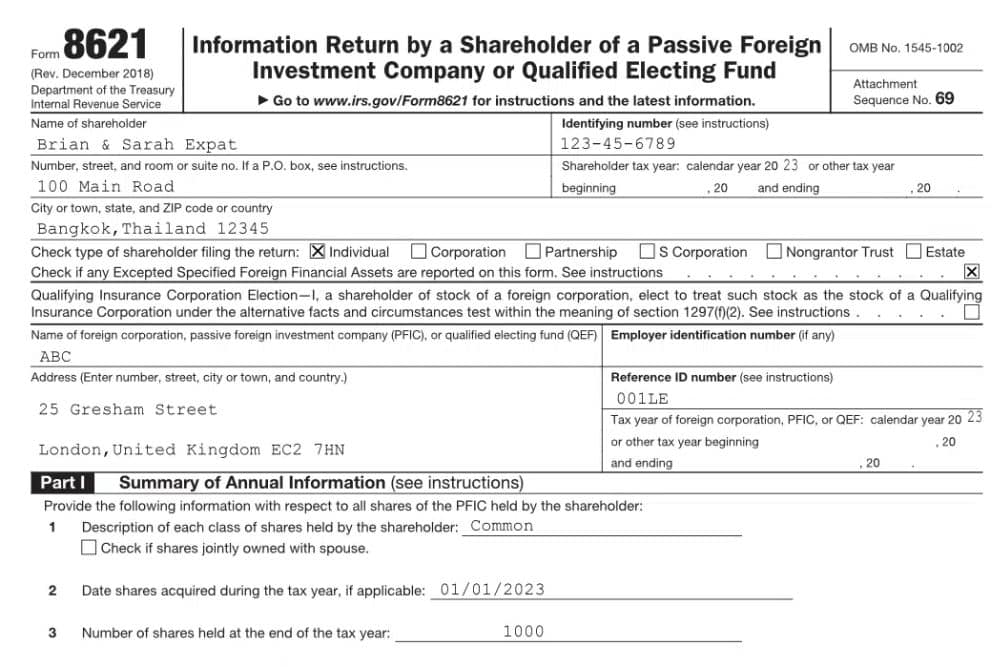Passive Foreign Investment Company (PFIC) Tax Rules and Reporting Requirements

- PFIC Definition: Income and Asset Tests
- Common PFIC Examples vs Non-PFICs
- Why PFIC Rules Matter for Americans
- How PFICs Are Taxed (and Why It’s Complicated)
- What’s Form 8621? (And When Do You File It?)
- Are There Exceptions?
- PFIC Reporting Exceptions
- How to Identify PFIC Investments
- PFIC Tax Strategies and Planning
- What Happens If You Miss PFIC Rules?
- When to Seek PFIC Tax Assistance
- Frequently Asked Questions About PFICs
- 2025 PFIC Updates & Tips
- Need Help with Your PFIC Requirements?
A Passive Foreign Investment Company (PFIC) is just a fancy IRS term for a foreign investment, like a mutual fund or ETF, set up outside the US, where most of its money is made from things like dividends, interest, or rent.
If you’re a US taxpayer investing overseas, PFICs are a big deal for your taxes, and you want to get it right to avoid headaches and penalties.
Not sure if your investments count as PFICs? Talk to a Greenback tax expert today to get clarity before the tax deadline.
PFIC Definition: Income and Asset Tests
The IRS looks at two things every year to decide if a foreign investment is a PFIC:
- Income Test (75% Rule): If 75% or more of its income is “passive” (like interest, dividends, rent, or capital gains), it’s a PFIC.
- Asset Test (50% Rule): If 50% or more of what it owns is there to make passive income, that counts too.
What Is Considered Passive Income?
- Dividends from stocks
- Interest from savings
- Rental income and royalties
- Capital gains from securities trading
- Income from commodities and foreign currency transactions
- Annuity payments and substitute dividend payments
Common PFIC Examples vs Non-PFICs
Typical PFICs Include:
- Foreign mutual funds and ETFs (including index funds)
- Foreign real estate investment trusts (REITs)
- Non-US investment trusts and unit trusts
- Foreign insurance or pension funds (in some cases)
- Foreign hedge funds and private equity funds
What’s NOT a PFIC:
- US-registered funds (ISIN starting with “US”)
- Individual foreign company stocks (like Shell, Vodafone, HSBC)
- Most foreign pension plans (until distribution)
- Active foreign businesses (failing the passive income tests)
Check the International Securities Identification Number (ISIN). If it starts with “US,” it’s not a PFIC.
Dreading the last minute scramble pulling together your tax documents? Despair no more! This simple checklist lists the documents you need to have on hand when preparing to file.

Why PFIC Rules Matter for Americans
If you’re a US citizen, a green card holder, or a US resident with foreign investments, PFIC rules follow you, no matter where you live.
Every year, you must report PFICs on your US tax return and possibly file extra forms.
How PFICs Are Taxed (and Why It’s Complicated)
1. Excess Distribution Method (the “default” way):
- The IRS taxes you harshly when you get big payouts or sell your PFIC.
- You pay regular tax plus extra interest for each year you owned it.
- This is usually the most expensive method for long-term investors.
2. Mark-to-Market (MTM) Election:
- Available for PFICs, you can sell on a public exchange.
- Every year, you treat gains as ordinary income—even if you didn’t actually sell.
- You avoid interest charges, but this can mean paying tax sooner.
3. Qualified Electing Fund (QEF) Election:
- If the PFIC gives you the correct info, you can choose to report your share of its income each year.
- Treated a bit like a US mutual fund for tax purposes.
- BUT: You must make this election in the first year you own it, and not all funds allow it.
If you don’t report PFICs or miss an election, you can lose out on the best tax options, get stuck with bigger bills, and the IRS can audit you anytime.
PFIC tax rules can get expensive fast if you make the wrong election. Let Greenback’s specialists review your investments and help you choose the best approach.

What’s Form 8621? (And When Do You File It?)
If you own a PFIC, you’ll need to report it each year by filing IRS Form 8621 (Information Return by a Shareholder of a Passive Foreign Investment Company or Qualified Electing Fund) along with your tax return. You’ll need to file if you:
- Get distributions (money out) from the PFIC
- Sell or get rid of PFIC shares
- Make a QEF or MTM election
- Hold PFICs worth more than $25,000 (single) or $50,000 (joint)
Learn more about common expat tax forms you may need to file.
You’ll need details like:
- What you own
- What you earned or received
- Which tax method will you choose
- Calculations showing your income
Are There Exceptions?
Yes—sometimes! You might NOT need to file Form 8621 if:
1. You have a qualifying foreign retirement plan:
Some pensions (like UK SIPPs, Canadian RRSPs, or Australian Super funds) are tax-deferred under US rules, at least until you start taking money out.
2. Your investment is also a Controlled Foreign Corporation (CFC):
If enough US people own the company, you might file Form 5471 instead.
(The rules are complex—talk to a pro.)
Examples: UK SIPPs, Canadian RRSPs, Australian Superannuation (under specific conditions). Learn more about how Superannuation affects US expat taxes.
PFIC Reporting Exceptions
1. Foreign Pension Plan Exception
Certain qualifying foreign retirement plans may be exempt if:
- Income is tax-deferred under the plan
- No early withdrawals or plan modifications
- The plan qualifies under US tax treaty provisions
Examples: UK SIPPs, Canadian RRSPs, Australian Superannuation (under specific conditions)
2. Controlled Foreign Corporation (CFC) Overlap
If your PFIC also qualifies as a Controlled Foreign Corporation:
- May only need Form 5471 instead of Form 8621
- Applies when US persons own >50% of a foreign corporation
- Complex ownership attribution rules apply
How to Identify PFIC Investments
Step-by-Step PFIC Identification:
- Look for the ISIN code—“US” means it’s not a PFIC.
- Read the fund info—are most assets or income passive?
- Apply the IRS tests—75% income or 50% assets.
- Still unsure? Ask a tax advisor!
PFIC vs Non-PFIC Quick Reference:
| Investment Type | PFIC Status | Notes |
|---|---|---|
| Foreign mutual funds | Usually PFIC | Even index funds |
| Foreign ETFs | Usually PFIC | Unless US-registered |
| US mutual funds/ETFs | Not PFIC | Even with foreign holdings |
| Individual foreign stocks | Not PFIC | Unless investment companies |
| Foreign REITs | Usually PFIC | Real estate investment trusts |
PFIC Tax Strategies and Planning
Before Investing:
- Choose US-domiciled funds when possible
- Research PFIC status before purchasing foreign investments
- Plan election timing – QEF must be elected early
- Consider your overall expat tax strategy, including Foreign Earned Income Exclusion and Foreign Tax Credit benefits
After Investing:
- Evaluate election options with a tax professional
- Consider disposition timing to minimize tax impact
- Maintain detailed records for Form 8621 compliance
Common PFIC Mistakes to Avoid:
- Not recognizing the PFIC status of foreign investments
- Missing first-year QEF election deadlines
- Failing to file when crossing reporting thresholds
- Inadequate record-keeping for calculations
What Happens If You Miss PFIC Rules?
Potential Penalties:
- Form 8621 failure: Up to $10,000 per form, per year
- IRS can audit you forever (no time limit)
- Lose out on helpful tax elections
- More tax and interest if you don’t report everything
Why Professional Help Matters:
PFIC rules represent some of the most complex areas of US tax law. Professional guidance helps you:
- Identify PFIC investments accurately
- Choose the least expensive tax method
- Complete Form 8621 correctly
- Avoid penalties
Learn about Streamlined Filing Compliance Procedures to catch up on unfiled returns.
When to Seek PFIC Tax Assistance
Get help with your reporting if:
- You own foreign mutual funds, ETFs, or pooled investments
- You discover PFICs you forgot to report in past years
- You’re not sure what you own
- You want to choose the best election (QEF or MTM)
- You have both PFICs and CFCs
Annual help is useful for:
- Filing all your forms
- Optimizing your tax approach year after year
- Handling complicated cases and foreign taxes
- Coordinating with foreign tax obligations
- Managing multi-year compliance issues
Frequently Asked Questions About PFICs
What is a PFIC for US tax purposes?
A PFIC (Passive Foreign Investment Company) is a non-US corporation where at least 75% of income is passive or 50% of assets produce passive income. The IRS taxes US owners harshly to prevent offshore tax deferral.
How can I avoid PFIC tax treatment?
Prevention strategies include:
- Investing in US-registered mutual funds and ETFs instead
- Choosing individual foreign stocks over pooled funds
- Making QEF or MTM elections when beneficial
- Working with tax professionals for optimization
- Understanding expat tax deductions and credits available to you
Remember: Most expats can reduce their US tax liability through proper planning. Our complete 2025 US expat tax guide shows you how nearly two-thirds of expats owe $0 in US taxes.
What does PFIC stand for?
PFIC stands for Passive Foreign Investment Company – a classification under US tax law for foreign corporations that primarily generate passive income or hold passive assets.
What happens if I don’t report a PFIC?
Consequences include:
- IRS can audit indefinitely (no statute of limitations)
- Loss of the ability to make favorable elections
- Significant penalties and interest charges
- Potential criminal penalties for willful non-compliance
What is the PFIC reporting threshold?
For 2024-2025, you must file Form 8621 if the total PFIC value exceeds:
- $25,000 for single filers
- $50,000 for married filing jointly
Can I make a QEF election after the first year?
No – QEF elections must be made in the first year you own the PFIC. Missing this deadline forces you to use less favorable taxation methods. Learn more about Form 1040 filing requirements for expats.
2025 PFIC Updates & Tips
- IRS has new instructions for Form 8621—make sure you’re using the latest version
- The government is cracking down on PFIC compliance—don’t risk skipping this
- Review what you own before year-end to make smart choices about elections or sales
Need Help with Your PFIC Requirements?
Living abroad yet paying US taxes can be a complex process. PFIC tax requirements only add to the confusion. Greenback Expat Tax Services can help. We will guide you through the requirements and options relating to your PFIC investments and ensure that you comply with all regulations.
Contact us, and one of our customer champions will gladly help. If you need very specific advice on your specific tax situation, you can also click below to get a consultation with one of our expat tax experts.
This guide provides general information about PFIC taxation and should not be considered specific tax advice. PFIC rules are complex and fact-specific. Always consult qualified tax professionals for guidance on your particular situation.



